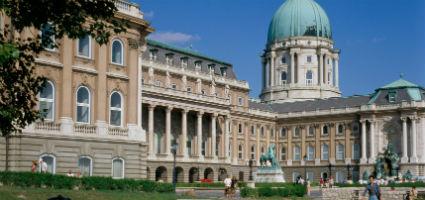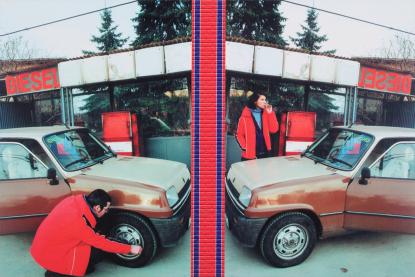2025. April 3. Thursday
Hungarian National Gallery - Budapest
 |
Address: 1014, Budapest Szent György tér 2.
Phone number: (1) 201-9082
E-mail: info@mng.hu
Opening hours: Tue-Sun 10-18
|
The exhibition has closed for visitors.
Museum tickets, service costs:
|
Individual ticket for adults
|
3200 HUF
|
/ capita
|
|
Individual ticket for students
|
1600 HUF
|
|
|
Individual ticket for pensioners
|
1600 HUF
|
/ capita
|
|
Video
|
1000 HUF
|
The exhibition titled TechnoCool, opening in the Hungarian National Gallery at the end of October, explores the way of thinking of the generation of artists, who started their career in the 1990s and who felt liberated by the economic-cultural openness after the change in the political system. The revolutionising spirit of electronic music, DJ culture, and the new visuality of parties served as key inspiration, manifesting in the visual language of the works and the issues addressed by them. The displayed works by more than fifty artists showcase the development of different media – paintings, readymades, photographs, prints, videos, and, to a lesser extent, computer-based art – in the nineties.

The Hungarian artists featured at the exhibition saw art as a new opportunity for self-expression during the nineties. Besides the traditional media of art, the possibilities provided by new visual tools, image editing programmes, and computers served as new forms of self-definition for an entire generation. The sections of the thematical exhibition showcase subjects that feel fresh and relavant from today’s perspective. The international context is created by showing works of foreign artists who exerted major influence in Hungary in the period: Muntean/Rosenbloom, Pippilotti Rist, Cindy Sherman, Andreas Gursky, and Matthew Barney, who was filming in Budapest at the time. The artworks evoking an exciting visual world, which has retained its novel feel to this day, can be seen in a spectacular interior together with several music, video, and educational installations.
Exhibited artists:
Zoltán Ádám, Andreas Gursky, Gábor Bakos, Matthew Barney, Emese Benczúr, Balázs Beöthy, András Braun, Marianne Csáky, Lajos Csontó, Attila Csörgő, EIKE, Róza El-Hassan, Ágnes Eperjesi, Gábor Erdélyi, Miklós Erhardt, Gábor Farkas, Róbert Ferenczi, András Gál, Pál Gerber, Gábor Gerhes, Tibor Gyenis, László Győrffy, Kinga Hajdú, Dominic Hislop, Mariann Imre, Tibor Iski Kocsis, Gyula Július, Balázs Kicsiny, András Király, Tamás Komoróczky, Endre Koronczi, János Kósa, Éva Köves, Adrián Kupcsik, Antal Lakner, Little Warsaw, Muntean/Rosenblum, Kriszta Nagy, Csaba Nemes, Hajnal Németh, Rudolf Pacsika, András Ravasz, Pippilotti Rist, Cindy Sherman, János Sugár, Dezső Szabó, Pál Szacsva y, Péter Szarka, Zoltán Szegedy-Maszák, András Szigeti, István Szili, Attila Szűcs, Csaba Uglár, Ágnes Uray-Szépfalvi, Vacuum TV, Ferenc Varga, Gyula Várnai, Zsolt Veress, Júlia Vécsei, Ákos Wechter, Imre Wéber
Precursors:
Gábor Bachman, László Beke, Ákos Birkás, Gábor Bódy, Miklós Erdély, György Jovánovics, Zsigmond Károlyi, Tamás Körösényi, Dóra Maurer, László Rajk, György Soós, Tamás Szentjóby

The Hungarian artists featured at the exhibition saw art as a new opportunity for self-expression during the nineties. Besides the traditional media of art, the possibilities provided by new visual tools, image editing programmes, and computers served as new forms of self-definition for an entire generation. The sections of the thematical exhibition showcase subjects that feel fresh and relavant from today’s perspective. The international context is created by showing works of foreign artists who exerted major influence in Hungary in the period: Muntean/Rosenbloom, Pippilotti Rist, Cindy Sherman, Andreas Gursky, and Matthew Barney, who was filming in Budapest at the time. The artworks evoking an exciting visual world, which has retained its novel feel to this day, can be seen in a spectacular interior together with several music, video, and educational installations.
Exhibited artists:
Zoltán Ádám, Andreas Gursky, Gábor Bakos, Matthew Barney, Emese Benczúr, Balázs Beöthy, András Braun, Marianne Csáky, Lajos Csontó, Attila Csörgő, EIKE, Róza El-Hassan, Ágnes Eperjesi, Gábor Erdélyi, Miklós Erhardt, Gábor Farkas, Róbert Ferenczi, András Gál, Pál Gerber, Gábor Gerhes, Tibor Gyenis, László Győrffy, Kinga Hajdú, Dominic Hislop, Mariann Imre, Tibor Iski Kocsis, Gyula Július, Balázs Kicsiny, András Király, Tamás Komoróczky, Endre Koronczi, János Kósa, Éva Köves, Adrián Kupcsik, Antal Lakner, Little Warsaw, Muntean/Rosenblum, Kriszta Nagy, Csaba Nemes, Hajnal Németh, Rudolf Pacsika, András Ravasz, Pippilotti Rist, Cindy Sherman, János Sugár, Dezső Szabó, Pál Szacsva y, Péter Szarka, Zoltán Szegedy-Maszák, András Szigeti, István Szili, Attila Szűcs, Csaba Uglár, Ágnes Uray-Szépfalvi, Vacuum TV, Ferenc Varga, Gyula Várnai, Zsolt Veress, Júlia Vécsei, Ákos Wechter, Imre Wéber
Precursors:
Gábor Bachman, László Beke, Ákos Birkás, Gábor Bódy, Miklós Erdély, György Jovánovics, Zsigmond Károlyi, Tamás Körösényi, Dóra Maurer, László Rajk, György Soós, Tamás Szentjóby
